Related Research Articles

George Harrison was an English musician and singer-songwriter who achieved international fame as the lead guitarist of the Beatles. Sometimes called "the quiet Beatle", Harrison embraced Indian culture and helped broaden the scope of popular music through his incorporation of Indian instrumentation and Hindu-aligned spirituality in the Beatles' work. Although the majority of the band's songs were written by John Lennon and Paul McCartney, most Beatles albums from 1965 onwards contained at least two Harrison compositions. His songs for the group include "Taxman", "Within You Without You", "While My Guitar Gently Weeps", "Here Comes the Sun" and "Something".
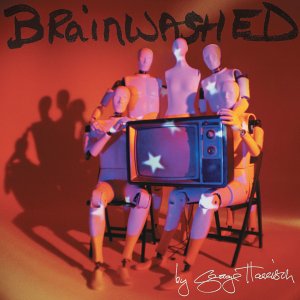
Brainwashed is the twelfth and final studio album by English rock musician George Harrison. It was released posthumously on 18 November 2002, almost a year after his death at age 58, and 15 years after his previous studio album, Cloud Nine. Recordings began over a decade before Harrison's death but were repeatedly delayed. The album's overdubs were completed by his son Dhani, session drummer Jim Keltner, and longtime friend and collaborator Jeff Lynne.

Wonderwall Music is the debut solo album by English musician George Harrison and the soundtrack to the 1968 film Wonderwall, directed by Joe Massot. Released in November 1968, it was the first solo album by a member of the Beatles, and the first album issued on the band's Apple record label. The songs are all instrumental pieces, except for occasional non-English language vocals, and mostly comprise short musical vignettes. Following his Indian-styled compositions for the Beatles since 1966, he used the film score to further promote Indian classical music by introducing rock audiences to instruments that were relatively little-known in the West – including shehnai, sarod, tar shehnai and santoor. The Indian pieces are contrasted by Western musical selections, in the psychedelic rock, experimental, country and ragtime styles.
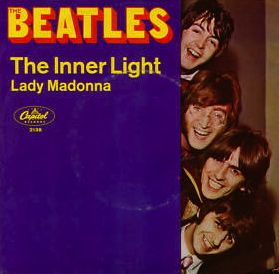
"The Inner Light" is a song by the English rock band the Beatles, written by George Harrison, the band's lead guitarist. It was released on a non-album single in March 1968, as the B-side to the Lennon–McCartney-written "Lady Madonna". The song was the first Harrison composition to be issued on a Beatles single and reflects the band's embrace of Transcendental Meditation, which they were studying in India under Maharishi Mahesh Yogi at the time of the single's release. After "Love You To" and "Within You Without You", it was the last of Harrison's three songs from the Beatles era that demonstrate an overt Indian classical influence and are styled as Indian pieces. The lyrics are a rendering of a poem from the Taoist Tao Te Ching, which he set to music on the recommendation of Juan Mascaró, a Sanskrit scholar who had translated the passage in his 1958 book Lamps of Fire.

"Bangla Desh" is a song by English musician George Harrison. It was released as a non-album single in July 1971, to raise awareness for the millions of refugees from the country Bangladesh, formerly known as East Pakistan, following the 1970 Bhola cyclone and the outbreak of the Bangladesh Liberation War. Harrison's inspiration for the song came from his friend Ravi Shankar, a Indian-Bengali musician, who approached Harrison for help in trying to alleviate the suffering. "Bangla Desh" has been described as "one of the most cogent social statements in music history" and helped gain international support for Bangladeshi independence by establishing the name of the fledgling nation around the world. In 2005, United Nations Secretary-General Kofi Annan identified the song's success in personalising the Bangladesh crisis, through its emotive description of Shankar's request for help.
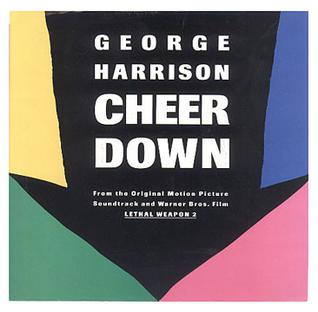
"Cheer Down" is a song by English musician George Harrison that was first released in 1989. The track was his contribution to the soundtrack of the film Lethal Weapon 2 and was also issued as a single. Harrison wrote the song with Tom Petty and co-produced the recording with Jeff Lynne.
John Barham is an English classical pianist, composer, arranger, producer and educator. He is best known for his orchestration of George Harrison albums such as All Things Must Pass (1970) and for his association with Indian sitar maestro Ravi Shankar.
"Be Here Now" is a song by English rock musician George Harrison from his 1973 album Living in the Material World. The recording features a sparse musical arrangement and recalls Harrison's work with the Beatles during 1966–1968, through its Indian-inspired mood and use of sitar drone. Part of Harrison's inspiration for the song was the popular 1971 book Be Here Now by spiritual teacher Ram Dass – specifically, a story discussing the author's change in identity from a Western academic to a guru in the Hindu faith. Some Harrison biographers interpret "Be Here Now" as a comment from him on the public's nostalgia for the past following the Beatles' break-up.

"Deep Blue" is a song by English rock musician George Harrison that was released as the B-side to his 1971 charity single "Bangla Desh". Harrison wrote the song in 1970, midway through the recording sessions for All Things Must Pass, and recorded it in Los Angeles the following year while organising the Concert for Bangladesh. The composition was inspired by the deteriorating condition of his mother, Louise, before she succumbed to cancer in July 1970, and by Harrison's feelings of helplessness as he visited her in hospital in the north of England. Given the subject matter, "Deep Blue" also served to convey the suffering endured by the millions of refugees from war-torn Bangladesh in 1971, as sickness and disease became widespread among their makeshift camps in northern India.

"Hari's on Tour (Express)" is an instrumental by English musician George Harrison, released as the opening track of his 1974 album Dark Horse. It was also the B-side of the album's second single – which was "Ding Dong, Ding Dong" in North America and most other territories, and "Dark Horse" in Britain and some European countries. Among Harrison's post-Beatles solo releases, the track is the first of only two genuine instrumentals he released from 1970 onwards – the other being the Grammy Award-winning "Marwa Blues", from his 2002 album Brainwashed.

"Māya Love" is a song by English musician George Harrison, released on his 1974 album Dark Horse. The song originated as a slide guitar tune, to which Harrison later added lyrics relating to the illusory nature of love – maya being a Sanskrit term for "illusion", or "that which is not". Harrison's biographers consider the lyrical theme to be reflective of his failed marriage to Pattie Boyd, who left him for his friend Eric Clapton shortly before the words were written. Harrison recorded the song at his home, Friar Park, on the eve of his North American tour with Ravi Shankar, which took place in November and December 1974. The recording features Harrison's slide guitar extensively and contributions from four musicians who formed the nucleus of his tour band: Billy Preston, Tom Scott, Willie Weeks and Andy Newmark. Reviewers note the track as an example of its parent album's more diverse musical genres, namely funk and rhythm and blues, compared with the more traditional rock orientation of Harrison's earlier solo work.
"It Is 'He' " is a song by English musician George Harrison, released as the final track of his 1974 album Dark Horse. Harrison was inspired to write the song while in the Hindu holy city of Vrindavan, in northern India, with his friend Ravi Shankar. The composition originated on a day that Harrison describes in his autobiography as "my most fantastic experience", during which his party and their ascetic guide toured the city's temples. The song's choruses were adapted from the Sanskrit chant they sang before visiting Seva Kunj, a park dedicated to Krishna's childhood. The same pilgrimage to India led to Harrison staging Shankar's Music Festival from India in September 1974 and undertaking a joint North American tour with Shankar at the end of that year.
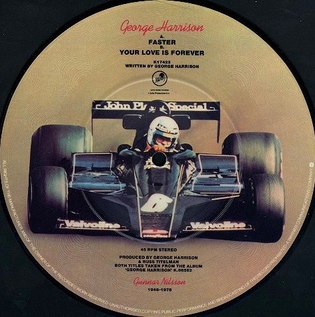
"Your Love Is Forever" is a song by English rock musician George Harrison from his 1979 album George Harrison. He wrote it as a guitar instrumental in an open tuning, before adding lyrics at the suggestion of his co-producer, Russ Titelman. The lyrics have an ambiguity typical of Harrison's work, in that the love he expresses is directed towards both a romantic partner and his God. In the United Kingdom, the song was also issued as the B-side of "Faster", on a charity single benefiting the cancer research project set up by the late Formula 1 driver Gunnar Nilsson.
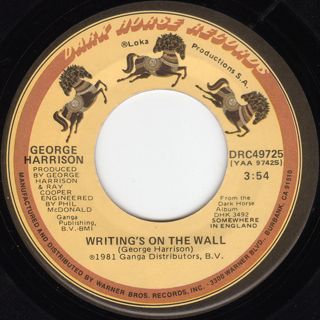
"Writing's on the Wall" is a song by English musician George Harrison from his 1981 album Somewhere in England. It was also the B-side of the album's lead single, "All Those Years Ago", which Harrison wrote as a tribute to his former Beatles bandmate John Lennon. In his lyrics, Harrison sings of the transient nature of life and the importance of recognising a spiritual purpose. Although the song was written long before Lennon's murder in New York in December 1980, the lyrics' reference to how easily friends can be shot down and killed led listeners to interpret it as a further comment on Lennon's death.
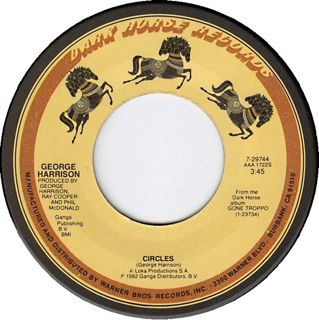
"Circles" is a song by English rock musician George Harrison, released as the final track of his 1982 album Gone Troppo. Harrison wrote the song in India in 1968 while he and the Beatles were studying Transcendental Meditation with Maharishi Mahesh Yogi. The theme of the lyrics is reincarnation. The composition reflects the cyclical aspect of human existence as, according to Hindu doctrine, the soul continues to pass from one life to the next. Although the Beatles never formally recorded it, "Circles" was among the demos the group made at Harrison's Esher home, Kinfauns, in May 1968, while considering material for their double album The Beatles.

Chants of India is an album by Indian musician Ravi Shankar released in 1997 on Angel Records. Produced by his friend and sometime collaborator George Harrison, the album consists of Vedic and other Hindu sacred prayers set to music, marking a departure from Shankar's more familiar work in the field of Hindustani classical music. The lyrical themes of the recorded chants are peace and harmony among nature and all creatures. Sessions for the album took place in the Indian city of Madras and at Harrison's home in Henley-on-Thames, Oxfordshire, following his work on The Beatles' Anthology (1995). Anoushka Shankar, John Barham, Bikram Ghosh, Tarun Bhatacharaya and Ronu Majumdar are among the many musicians who contributed to the recording.
"Ride Rajbun" is a song by English musician George Harrison. It was released in 1992 on the multi-artist charity album The Bunbury Tails, which was the soundtrack to the British animated television series of the same name. Harrison co-wrote the song's lyrics with Bunbury Tails creator David English. The eponymous Rajbun was a character in the series based on English's friend and cricketer Rajendrasinh Jadeja, one of a team of cricket-playing rabbits – in this case, from Bangalore in India. The composition is in the style of a nursery rhyme or children's song, while the all-Indian instrumentation on the recording recalls some of Harrison's compositions for the Beatles during 1966–68.

Collaborations is a four-disc compilation box set by Indian classical musician Ravi Shankar and former Beatle George Harrison. Released in October 2010 on Dark Horse Records, it compiles two studio albums originally issued on that label – the long-unavailable Shankar Family & Friends (1974) and Ravi Shankar's Music Festival from India (1976) – and Chants of India, first issued on Angel Records in 1997. Although all three albums were originally Shankar releases, for which Harrison served in the role of music producer and guest musician, both Shankar and Harrison are credited as artists on the box set. Each of the collaborative projects represents a departure from Shankar's more typical work as a sitarist and performer of Hindustani classical ragas, with the box set showcasing his forays into, variously, jazz and rock, Indian folk and orchestral ensembles, and devotional music.

Raga Mala is an autobiographic work by Indian classical musician Ravi Shankar, published in 1997 as a hand-bound, limited edition book by Genesis Publications. The initial print run was limited to 2000 signed and individually numbered copies, with a foreword by George Harrison, who also served as Shankar's editor. In addition, Oliver Craske was credited with providing "additional narrative".
References
- ↑ Leng, p. 326.
- 1 2 3 Lavezzoli, p. 198.
- ↑ "Grammy Award Winners". The New York Times. 16 January 2013. Archived from the original on 11 February 2009. Retrieved 24 December 2008.
- ↑ Inglis, p. 121.
- ↑ Inglis, p. 128.
- ↑ Leng, p. 299.
- ↑ Inglis, p. 120.
- ↑ Inglis, pp. 120–21.
- ↑ Leng, pp. 299–300.
- ↑ Leng, p. 300.
- ↑ Harry, pp. 40–41.
- ↑ Huntley, p. 330.
- ↑ Lavezzoli, pp. 178–79.
- ↑ Harry, p. 264.